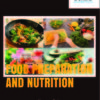Food and nutrition sustainability, a significant global problem, relies on a sufficient supply of healthy, accessible and safe fresh and processed food to all people. The challenge of providing 9 billion people with healthy diets in 2050 will be met by increasing food production. Nevertheless, the reduction of food losses throughout the supply chain, from production to consumption, and the continuous improvement of food preservation, nutrient content, quality and shelf life, made possible by food processing, will also be important. Both growth and development in early life and childhood depend on the potential for good nutrition, which in itself defines the future resilience of the person to daily stress and disease vulnerability. Nutritional factors indicate the vulnerability to the risk of acute non-communicable diseases during adulthood. Undernutrition and obesity increase susceptibility to ill-health by reducing tolerance and capacity to cope with any stress, infective, psychological or societal. Nutritionists are using theories from molecular biology, biochemistry, and genetics to explain how nutrients influence the human body.
In this book, students will know the biological and chemical structure of food and how its protection will affect nutritional quality. The book not only will provide you a thorough understanding of food structure and analysis but will also provide you with a high level of nutrition and microbiology experience.
There are many types of food and drink available around the world, and with the effects of globalization, international food companies are setting up their businesses all over the world. For food and nutrition, it is important for individuals to understand the differences between healthy and unsanitary food items, to consume healthy food items, and not to avoid unsanitary food items completely, but to consume them once in a while.
The book highlights the importance of nutrition, and the main areas that have been discussed are the need for food processing and nutrition. Inside educational institutions and training centers, it has been noted that, in addition to other educational principles and subjects, nutrition awareness and concepts related to diet and health are also taken into account.
Good nutrition is essential for good health and disease prevention, diagnosis and management. Exposure to a healthy and sustainable diet is a fundamental requirement across the lifetime and the globe. Nevertheless, the relationship between food, nutrition and health is complex, nuanced, multi-faceted and highly influenced by biological and environmental, socio-economic, cultural and behavioral factors. Global population growth, climate change and stress on natural resources, limited access to healthy food, unhealthy lifestyles and growing consumer demand are all a rising challenge. Paradoxically, while around 800 million people in the developing world are suffering from chronic undernutrition, both developed and developing economies are facing increasing rates of obesity and diet-related disease. This is primarily due to changes in patterns of eating and the type of food eaten, as well as to more sedentary lifestyles. High quality, interdisciplinary nutrition research and efficient collaboration are key to improving global health. This book provides a comprehensive and combined coverage of food science, food technology, and nutrition.














Earnest –
Good day! Do you know if they make any plugins to assist with Search Engine Optimization? I’m trying to
get my blog to rank for some targeted keywords but I’m not seeing very good gains.
If you know of any please share. Kudos! You can read similar art here: Code of destiny
ssxsv –
cost of generic clomiphene without a prescription can i purchase clomiphene online clomiphene for sale uk where to get clomiphene price where can i buy clomiphene pill can you get cheap clomiphene without insurance clomid cost australia
afgan pills cialis index –
The vividness in this serving is exceptional.
does flagyl kill e coli –
Greetings! Jolly gainful par‘nesis within this article! It’s the crumb changes which liking turn the largest changes. Thanks a quantity for sharing!
276my –
how to buy zithromax – tindamax 300mg uk order flagyl 400mg pills
66rzy –
order rybelsus 14 mg sale – cyproheptadine 4 mg cheap buy generic periactin over the counter
rgd6u –
domperidone 10mg us – cheap sumycin 250mg flexeril 15mg canada
g2228 –
inderal 20mg price – inderal for sale online methotrexate 10mg without prescription
41mcu –
amoxicillin uk – valsartan 80mg tablet oral combivent
7vcpg –
buy azithromycin without a prescription – where can i buy nebivolol buy bystolic 5mg pill
6k010 –
amoxiclav for sale online – atbioinfo.com buy cheap generic acillin
tyvx0 –
nexium 20mg price – anexa mate buy nexium 20mg online
qaqs7 –
order coumadin 5mg sale – https://coumamide.com/ purchase cozaar
64cqz –
meloxicam for sale online – moboxsin.com buy mobic
dad3o –
prednisone 40mg cheap – apreplson.com buy prednisone 5mg for sale
tmzvf –
blue pill for ed – best otc ed pills top ed drugs
bxj23 –
buy generic amoxicillin over the counter – combamoxi.com amoxicillin pill